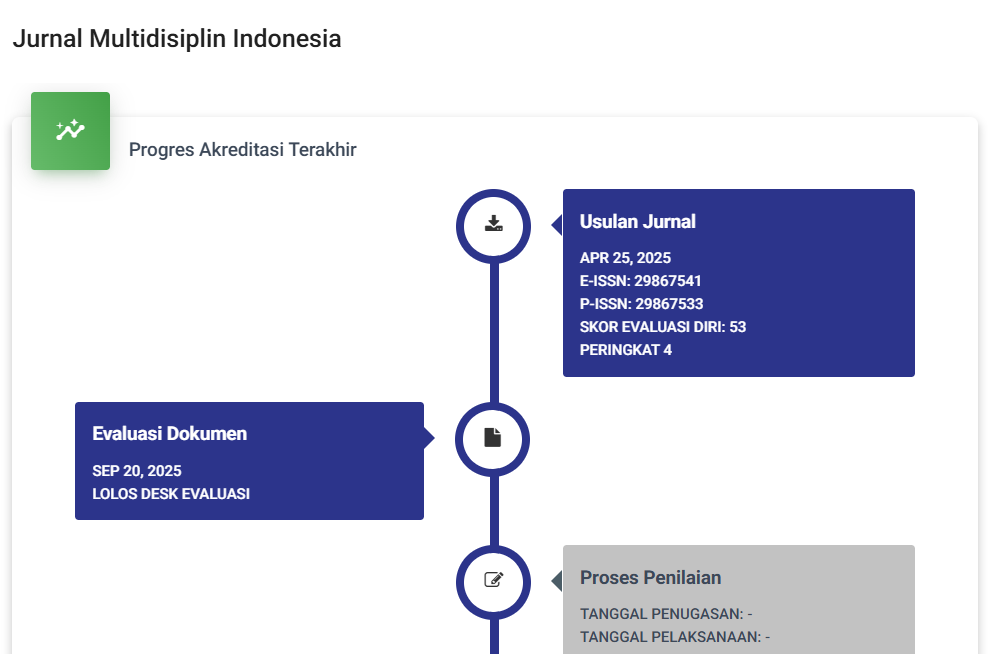The Polemic Of Discretion In Abuse Of Authority By Public Officials In The Perspective Of The Principles Of A Clean And Corruption-Free Legal State
DOI:
https://doi.org/10.62007/joumi.v3i2.500Keywords:
Discretion, abuse of authority, public officials, state of law, corruption, accountabilityAbstract
Discretion is a legal instrument given to public officials to make decisions or act under certain conditions without explicit laws and regulations. Discretion is critical in government, especially in providing flexibility for state apparatus to perform their duties and obligations. However, in practice, discretion is often misused by public officials under the pretext of broader administrative or policy interests. Abuse of authority through discretion can give rise to various legal problems, including increased practices of corruption, collusion, and nepotism (KKN), which are contrary to the principles of a clean and corruption-free legal state. Therefore, an in-depth study is needed regarding the limitations, supervision, and accountability mechanisms of public officials in implementing discretion so that it does not conflict with the principles of good governance and legal certainty. This study uses a normative juridical method with a statute and a conceptual approach. The analysis was conducted on various legal norms that regulate discretion, including the Law on Government Administration, as well as the principles of administrative law relating to the authority of public officials. In addition, this study also examines the mechanism of supervision of discretion to prevent abuse of authority that can harm the interests of society and the state. Thus, this study is expected to provide a deeper understanding of discretion in a state of law and provide recommendations on possible actions to strengthen the supervision and accountability of public officials in exercising their authority.
References
Abu Muhlizi, A. F. (2012). Reformulasi Diskresi dalam Penataan Hukum Administrasi. Jurnal Rechts Vinding: Media Pembinaan Hukum Nasional, 1(1), 93-111.
Almahdali, H. S. (2024). Pengantar Ilmu Administrasi Negara. Gadut: Yayasan Tri Edukasi Ilmiah.
Ansori, L. (2015). Diskresi Dan Pertanggungjawaban Pemerintah Dalam Penyelenggaraan Pemerintahan. Jurnal Yuridis, 2(1), 135-150.
Arifin, F. (2025). REKONSEPTUALISASI DISKRESI PERSPEKTIF HUKUM ADMINISTRASI NEGARA: ANALISIS KRITIS TERHADAP IMPLEMENTASI UNDANG-UNDANG ADMINISTRASI PEMERINTAHAN NASIONAL. Audi Et AP: Jurnal Penelitian Hukum, 4(01), 25-37.
Asmara, G. (2022). Urgensi Kewenangan Diskresi Dalam Penyelenggaraan Pemerintahan Untuk Memajukan Kesejahteraan Umum. Jurnal Diskresi, 1(1).
Aviano, M. S. (2022). Pertanggungjawaban Pejabat Pemerintah Yang Menggunakan Diskresi Menurut Hukum Positif Di Indonesia. Jurnal Hukum dan Kenotariatan, 6(2), 1297-1325.
Azhar, M. (2015). Relevansi asas-asas umum pemerintahan yang baik dalam Sistem penyelenggaraan administrasi Negara. Notarius, 8(2), 274-286.
Budianta, E. (2016). Penggunaan Diskresi dalam Birokrasi Pemerintahan. PROGRESIF: Jurnal Hukum, 10(2).
Endang, M. I. (2018). Diskresi Dan Tanggung Jawab Pejabat Pemerintahan Menurut Undang-Undang Administrasi Pemerintahan/Discretion and Responsbility of Government Officials Based on Law of State Administration. Jurnal Hukum Peratun, 1(2), 223-244.
Hadi, I. G. (2017). Pertanggungjawaban Pejabat Pemerintahan Dalam Tindakan Diskresi Pasca Berlakunya Undang-Undang No. 30 Tahun 2014 Tentang Administrasi Pemerintahan. Kertha Patrika, 39(01), 33-46.
Huda, N. M. (2024). Politik Hukum dan Pembangunan Sistem Hukum Nasional. Jakarta: Sinar Grafika.
Kumalaningdyah, N. (2019). Pertentangan Antara Diskresi Kebijakan Dengan Penyalahgunaan Wewenang Dalam Tindak Pidana Korupsi. Jurnal Hukum Ius Quia Iustum, 26(3), 481-499.
Nalle, V. I. (2016). Kedudukan Peraturan Kebijakan Dalam Undang-Undang Administrasi Pemerintahan. Refleksi Hukum: Jurnal Ilmu Hukum, 10(1), 1-16.
Pratiwi, C. S. (2016). Asas-Asas Umum Pemerintahan yang Baik. Jakarta: Lembaga Kajian dan Advokasi untuk Independensi Peradilan (LeIP).
Rahim, A. A. (2023). Relevansi Asas Kepastian Hukum dalam Sistem Penyelenggaraan Administrasi Negara Indonesia. JIIP-Jurnal Ilmiah Ilmu Pendidikan, 6(8), 5806-5811.
Setiawan, A. &. (2020). Tanggung Jawab Jabatan dan Tanggung Jawab Pribadi Dalam Penggunaan Diskresi. Kosmik Hukum, 20(1), 1-12.
Solechan, S. (2019). Asas-asas umum pemerintahan yang baik dalam pelayanan publik. Administrative Law and Governance Journal, 2(3), 541-557.
Sumeleh, E. J. (2017). Implementasi Kewenangan Diskresi dalam Perspektif Asas-asas Umum Pemerintahan yang Baik (AUPB) Berdasarkan Undang-Undang No. 30 Tahun 2014 Tentang Administrasi Pemerintahan. Lex Administratum, 5(9).
Susilo, A. B. (2015). Makna dan kriteria diskresi Keputusan dan/atau tindakan pejabat publik dalam mewujudkan tata pemerintahan yang baik. Jurnal Hukum dan Peradilan, 4(1), 133-152.
Syafril, R. E. (2023). Analisis Wewenang Pemerintah dalam Kuasa Diskresi Administrasi. JESS (Journal of Education on Social Science), 7(2), 219-228.
Downloads
Published
How to Cite
Issue
Section
License
Copyright (c) 2025 Andik Puja Laksana, Suparno Suparno

This work is licensed under a Creative Commons Attribution-ShareAlike 4.0 International License.







